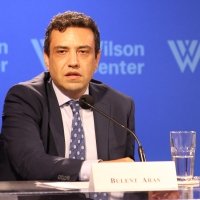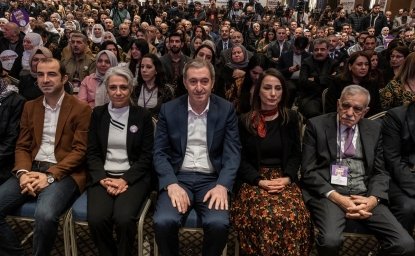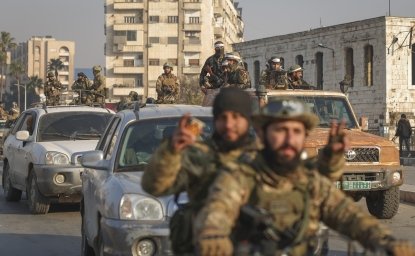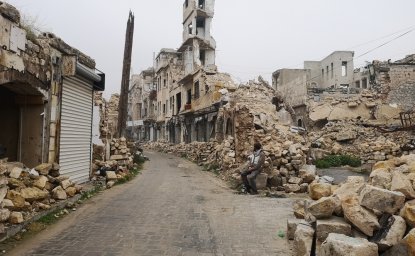The People Who Stood Straight



The night of July 15 has turned out to be the longest night in recent Turkish history. The tanks and troops in the streets and the low flying F-16s in the skies of Istanbul and Ankara turned out to be a coup attempt against the government. There was an announcement on state television that the so-called “Peace in the Country Council” was taking power in Turkey. The putschists—people involved in plotting and carrying out a coup attempt—had taken control of Istanbul Atatürk Airport, two bridges over the Bosphorus, and critical state buildings. Their tanks were moving toward the presidential palace in Ankara. Most importantly, they occupied the headquarters of the chief of staff and held all major commanders captive in unknown locations.
However, in just a few hours, Turkish civilians had rushed into the streets and started to take back control of public buildings, stopping the tanks and delivering soldiers to security forces. Toward early morning the next day, it became clear that the putschists were only a small part of the military and that they were not capable of mobilizing the entire army against the people and the government. The putschists became more violent after recognizing that they were failing and bombed the parliament and the presidential palace several times from the air while also shooting people on the street. Overall, 240 people were killed and nearly 2,000 more were wounded.
Although some had already taken to the streets to protest the coup, President Recep Tayyip Erdogan’s late-night call for all citizens to resist the putschists was a critical move and instrumental in taking control of the situation. Thousands more took to the streets to support Erdogan and defy the coup after the president’s call.
The night of the coup, I landed in the domestic terminal of Istanbul Atatürk Airport only to find myself in the middle of chaos. There were policemen around, but no one was visibly in charge. Everything was in a state of uncertainty. There was no transportation to or from the airport—whether by taxi or by bus, inside or outside airport grounds—and the only way to exit was by walking through the main entry gate. Even then, the bridges on the Bosphorus were blocked for passage.
Living on the Asian side of Istanbul, I decided to stay at a friend’s place relatively close to the airport. After walking two or three kilometers, a car stopped to offer me a ride. It turned out that the driver was going somewhere close to my friend’s house. There were already two people in the car, and the driver picked up another two on the way. I had come to find out that they were destined for the area where people had been attempting to stop the tanks of the coup plotters.
Those in the car vehemently argued that the coup is an attack not only on their lives but also on their livelihoods. When I asked if there were any updates on the situation while traveling, one person said that he did not believe the news because the putschists may have had control over the media.
Thousands of people rushed to the streets all over Turkey and spent the night outside facing the tanks, low flying F-16s and helicopters. The people on the street were from all segments of society and showed enormous levels of courage and endurance against the tanks. They challenged the soldiers, defying the principle of the putschists’ message. Women were on the frontlines and marked the night of July 15 with their heroic actions. One woman argued against the soldiers while facing several tanks on the Bosphorus Bridge, standing strongly against them and urging them to leave. Another woman drove a truck full of people to Taksim Square, which is the heart of Istanbul and symbolically and strategically important to the public. She risked her life without hesitation, passing armed soldiers, tanks, and other military vehicles along the way.
President Erdogan’s arrival and subsequent speech at Istanbul Atatürk Airport later in the night was a huge boost to the people who gathered around the president to stand against the putschists. The people on the streets were cognizant of the fact that if the coup was not defeated, their future—and the future of the next generation of Turks—would be bleak. Their stance changed the situation against the putschists and was instrumental in encouraging state security forces to oppress the coup. High-ranking generals declared their allegiance to the government and to the people throughout the night on television.
There is now a widespread consensus among the Turkish people that FETO (the terror organization of Fethullah Gulen supporters), including Gulen himself, is behind the coup. These Gulenists, who have conducted clandestine activities such as infiltrating the military for decades, committed this violent attack on the Turkish people. It is with this conviction that the Turkish people welcomed the declaration of a state of emergency for three months starting July 20. It is only in a state of emergency that the government will be able to purge Gulenist elements from public institutions, close their schools, and halt their finances in Turkey. This is a difficult task on the shoulders of the government, and the Turkish people are demanding it be done without harm to the innocent.
The righteous attitude of the people has united the parties in parliament against the coup. This is a unique situation, because there has not been a unified parliament on any matter in recent Turkish history. Turkish people and political parties have set aside their divisions and declared their belief in democracy for the future of the country. Both opposition and ruling parties have organized demonstrations after the failed coup, while representatives from the ruling party participated in the opposition parties’ protests.
The Turkish people have been on the streets every night since the coup plot, not only as a response to President Erdogan’s call but also as a means to protect the post-coup status quo. They want good governance, an end to polarization, the reorganization of the state, and overall a better Turkey. They recognize that it will take time for the state to recover from the trauma of the coup.
However, if the Turkish people remain united, this could serve as a guide to inclusive, power-sharing, and consensus-oriented politics and economy in Turkey. Politicians need the public’s courage and persistence to protect their country and develop future-oriented visions in response to demands for good governance. A necessary condition for this is to create a new political system and economy that will rule out the kinds of catastrophes the nation has faced and constitute building blocks for a better future. Those who would provide such a system would be serving, as banners across the cities read, “this noble people who prevented a coup!”
The opinions expressed herein are those of the author and do not reflect those of the Wilson Center.
Author

Professor of International Relations, Faculty of Arts and Social Sciences at Sabancı University, Istanbul, Turkey

Middle East Program
The Wilson Center’s Middle East Program serves as a crucial resource for the policymaking community and beyond, providing analyses and research that helps inform US foreign policymaking, stimulates public debate, and expands knowledge about issues in the wider Middle East and North Africa (MENA) region. Read more


Global Europe Program
The Global Europe Program is focused on Europe’s capabilities, and how it engages on critical global issues. We investigate European approaches to critical global issues. We examine Europe’s relations with Russia and Eurasia, China and the Indo-Pacific, the Middle East and Africa. Our initiatives include “Ukraine in Europe”—an examination of what it will take to make Ukraine’s European future a reality. But we also examine the role of NATO, the European Union and the OSCE, Europe’s energy security, transatlantic trade disputes, and challenges to democracy. The Global Europe Program’s staff, scholars-in-residence, and Global Fellows participate in seminars, policy study groups, and international conferences to provide analytical recommendations to policy makers and the media. Read more

Explore More
Browse Insights & Analysis
Imamoglu’s Arrest Sparks Nationwide Unrest and Raises Fears for Turkish Democracy

Kurdish Militant Group PKK Agrees to Disarm as Turkey Weighs Next Steps

